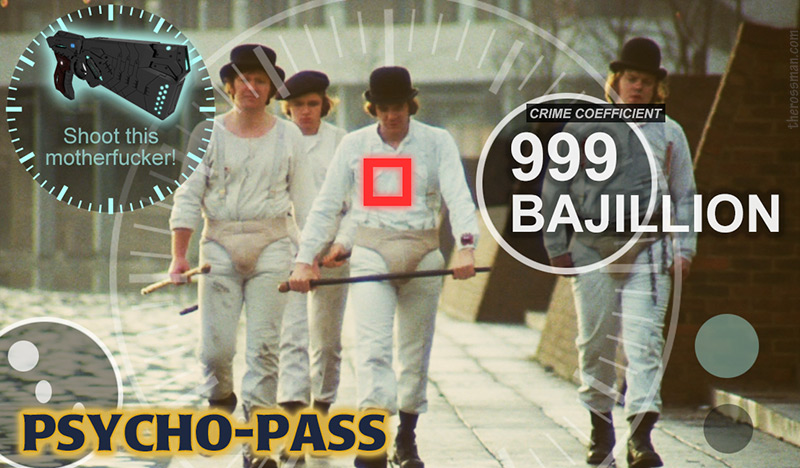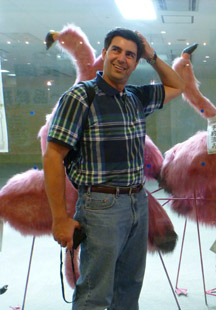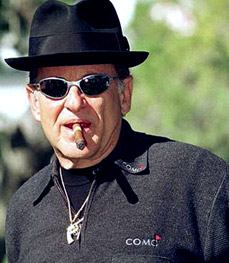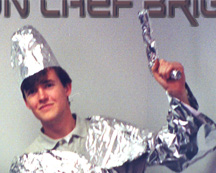
Psycho-Pass
(Reviewed on 06/04/2014)

The Passing ROSSMAN
It's been a while since a show surprised me in this way. I started off with a crystal clear idea of what Psycho-Pass was going to be about due to its first episode (which was less than inspiring to me), and stopped watching it based solely on my impressions on one of the main characters (who was a whiny, ultra-naive noob police detective who had to do "the right thing," even though it went against all her training and her superior's direct orders). I wanted her to get fired or die by an explosion or by drowning.
Several months after experiencing that one episode, I was recommended the show by a reader and I was told to press on past that premiere entry into the story. So I gave it another go. After I finished up the series on my second attempt I was very pleased that I persevered. Past that first 30 minutes of partial mongoloidation, this show becomes pretty damn intelligent. After our initial contact point with the main cast of characters, they quickly begin to actually ACT like detectives and piece cyber crimes together just as well as the Major and her crew in Ghost in the Shell: SAC. The story is very rich, and the questions that it leaves us with (queries like "when does too much technology truly destroy our humanity?") are big-ass questions, and we're given no real preachy answers as every character has his or her own thoughts on them.
So Psycho-Pass is all about life in future, dark, Blade-Runner-like Japan. Everybody is subject to rule by the ironclad Sibyl System: a giant computer network that values and judges people based on the clarity of their Psycho-Pass. The Psycho-Pass is the mental stability of a person's thoughts, and the darker and cloudier one's thoughts get the more likely that person is going to get violent and commit a crime. If a person has mental trauma enacted on them, or too much stress put upon their shoulders, then their Psycho-Pass gives off a higher and higher number. If it gets too high, then that person is placed in therapy. If it goes too high even for therapy to help, they're locked away and labeled as latent criminals. If a person is caught with a Psycho-Pass that's even higher than latent criminality, then that means that their crime coefficient parameters show that they're capable of committing immediate horrible violence upon another citizen, and that shit don't fly in future Tokyo. That's when the special guns that the police force carries unlock from safe mode and change from stun guns to splatter-making killing machines in the blink of the unfeeling Sibyl System's eye.
Police Inspectors are shield-carrying members of the law enforcement team. Each team has a couple Inspectors and a bunch of Enforcers. Enforcers are the team attack dogs — latent criminals with psychotic tendencies who are used as front-line muscle in taking down poor schmucks whose Psycho-Pass levels have gone up too high. "Use a psycho to catch a psycho," they say.... Okay, they never do say this, but I do say this now. The quotes stay on!
So the show itself is set up like a police procedural with an over-arcing plot. There are who-dunnits and how'd-they-do-its that set up the world and give you the rules of the Sibyl System that are impossible to bend or break... Then they bend and break those rules (in logical and extremely well-written ways) to show you how exemplary and Hannibal Lecter-smart the criminals in this series are. The lead up to the final battle is so good, and the ways that the lead criminals shatter the Sibyl System are so well-played that it would take a crime coefficient of 180 to ruin it for you. (You'll get that awesome inside joke if you watch the show.) Instead I'll tell you a bit more about the main characters, just 'cause this would be the shortest review I did in a long time if I stopped here. And I get paid by the word, so here goes.
The main Inspectors that we follow in the Public Safety Bureau's Criminal Investigation Division Unit One (seriously, that's what it's called) are veteran officer Nobuchika Ginoza, and n00b Akane Tsunemori. Ginoza is cold, calculating, and his crime coefficient is unusually high for an officer of the law, due to the stress of the job, the fact that his father was labeled a latent criminal, and he lost his ex-partner to the Sibyl System in the past. Tsunemori is the wide-eyed dope in the first episode, but she very quickly becomes a quick-thinking, almost hard-core cop who has to make some terrible decisions that place her ideas of what peace and society are really about on the sacrificial altar.
Then there's a bunch of Enforcers in Unit One, the most important being Shinya Kogame, the ex-partner of Ginoza. Kogame's crime coefficient jumped up into criminal levels when his friend was killed by the elusive "humanist" criminal mastermind known as Makishima and Kogame found that he only wanted to kill the bastardo instead of simply arresting him. And after seeing Makishima smirk and act like a douche for so long in this series I found I fully supported Kogame's decision.
There are no giant stupid jumps in logic in Psycho-Pass, and every action has massive repercussions. And as I said before, the bad guys aren't idiots in this thing. Actually outsmarting the bad guys proves very difficult when they can read your moves well before you make them. The main antagonist is the aforementioned Makishima, who has somehow eluded capture for years — even after getting his face photographed in "Big Brother" City — to the point that he's mostly just a rumored ghost to the police force. Makishima's cat and mouse game with Unit One is less akin to say Moriarty and Holmes, and more like an actual feral cat playing with and gnawing off the limbs of a field mouse. It's fucking brutal. And I liked it!
Up until episode 17 I was pretty into the series, but then something happened (a moment where it went from "This is pretty good" to "….Holy shit! Did that just happen? AMAZING") that took my enjoyment to levels I didn't think possible for a series with a premiere chapter that initially made me stop watching it. Everything builds up to a fine ending, but it just wasn't how I was expecting things to wrap up. I was expecting HUGE fireworks, the end of a way of life for a country of hundreds of millions... but it was a quiet finale instead. A quiet finale that didn't try to answer the biggest, most ambiguous questions asked by the series, and for that it had my gratitude. In hindsight, if they had gone big and actually answered their own morally grey-shaded questions I probably would have had a lot less respect for this show.


JOE PESCI
Holy fuck and shit! If they ever create those fuckin' guns that automatically shoot somebody for thinking bad thoughts like bashin' somebody's fuckin' well-deserved head in with a fuckin' baseball bat I am fuckin' SCREWED!
This shit stopped being funny, ya know! Now them government people got this idea in their heads! We're all fucked thanks to Japan and it's fucked up imagination. Thanks, you blundering fuck-heads! You fucked us all in our collective asses. I hope you're goddamn happy! You buncha assholes!


BOB FROM THE FUTURE


